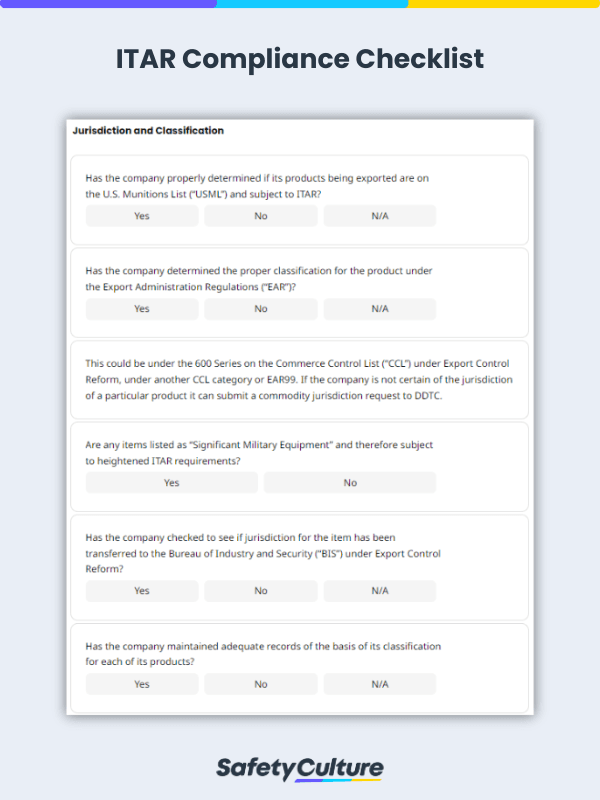What is ITAR Compliance?
The International Traffic in Arms Regulations (ITAR) requires all manufacturers, exporters, temporary importers, brokers, and furnishers of ITAR-controlled defense articles and services—including technical data—to register with the U.S. Department of State and obtain export licenses to stay ITAR compliant.
What is an ITAR Compliance Checklist?
An ITAR compliance checklist is used by arms suppliers to easily:
- determine if they are ITAR-compliant;
- establish an identification system for ITAR-controlled products;
- make sure that they are registered with DDTC; and
- implement an effective ITAR compliance program.
What to Include in Your ITAR Compliance Checklist?
Unlike other types of checklists, ITAR compliance checklists are quite specific and straightforward. They should help businesses comply with the laws of governing bodies handling arms regulation and should enable manufacturers to keep up with the current standards surrounding the industry. Additionally, ITAR compliance checklists can serve as a guide to ensure that all relevant stakeholders stay aware of the different jurisdictions, licenses, and classifications needed to be adhered to by their business. Here are several questions that you can include in your ITAR compliance checklist:
Importation/Registration
One of the most basic aspects of staying compliant with ITAR is registration and rules for importation. See some of the sample questions you can include in your checklist:
- Has the company imported any items on the United States Munitions List (USML) in temporary import transactions or on the USML in permanent import transactions with a license?
- Were all aspects of the import transaction within the terms, conditions, and provisos of such license?
- Is the company registered with the Directorate of Defense Trade Controls (DDTC) as a manufacturer and/or an exporter?
- Has the company notified DDTC within 5 days of changes to the information set forth in its Registration Statement?
- Does the company engage in brokering activities that require the company to register as a broker?
Export/Re-export
Clearance Requirements ITAR also aims to control the processes of export and reexport of arms. If your company engages in arms exportation, consider asking the questions below:
- Has the company complied with the export procedures for its exports of ITAR-controlled hardware?
- Has the company complied with the export procedures for exports of ITAR-controlled unclassified technical data?
- Has the company complied with the export procedures for the performance of Defense Services?
- If an ITAR-controlled item was properly exported (including ITAR-controlled technical data), was proper authorization obtained for reexports or retransfers of such items?
- Has the company followed the requirements for the proper administration of licenses and agreements?
Manufacturing License Agreements and Distribution Agreements
Aside from clearing procedures for international trades, arm businesses also observe various agreements that they should follow through. License and agreement-related questions can be along the lines of:
- Is the company licensing ITAR-controlled technical data to permit the manufacture overseas of an item on the USML?
- Has the company operated within the terms and conditions set forth in such agreements?
- Has the company filed its annual reports with DDTC related to operations under the Manufacturing License Agreement (MLA)?
- Has the company maintained records related to its manufacturing of ITAR-controlled products as required under the MLAs?
- Has the company operated within the terms and conditions set forth in such agreements?
5 Benefits of ITAR Compliance
Washington-based export attorney, Kay Georgi, says that one of the most common mistakes among businesses is the lack of a clearly communicated, accurately enforced, and properly documented ITAR compliance program. Here is how your company can benefit from staying compliant with ITAR:
1. Quality Manufacturing Output
Manufacturers of defense articles who ensure ITAR compliance inevitably guarantee the production of safe products as well. Improve productivity by verifying that the product design and manufacturing process comply with ITAR.
2. Optimized Export Operations
Exporters and temporary importers of defense articles who comply with ITAR gain visibility across their entire operations because of accurate maintenance of records. Avoid seizure and forfeiture in attempts at illegal exports by obtaining licenses and other approvals.
3. No Wasted Time and Money
Last year, the U.S. Department of State fined an Oregon-based thermal imaging infrared camera manufacturer $30 Million for export violations. ITAR compliance will save tons of money and valuable time from costly civil or criminal penalties and up to 10 years of imprisonment per violation.
4. Increased Employee Morale
Companies boost morale, provide job security, and assure employee retention when they remain ITAR compliant. Complying with ITAR prevents debarment or losing export licenses and allows companies to continue doing business in the defense industry.
5. Good Reputation
ITAR-compliant businesses are likely to acquire more government contracts and win bids in weapons and ammunition. Because of a strong brand image, loyal clients become advocates of the product. ITAR compliance naturally attracts potential customers, expands your network, and strengthens your supply chain.



